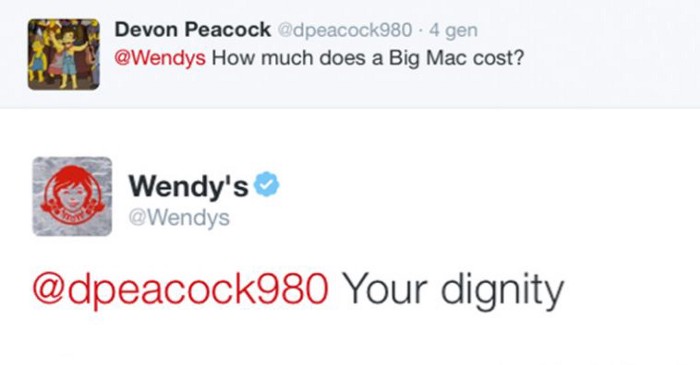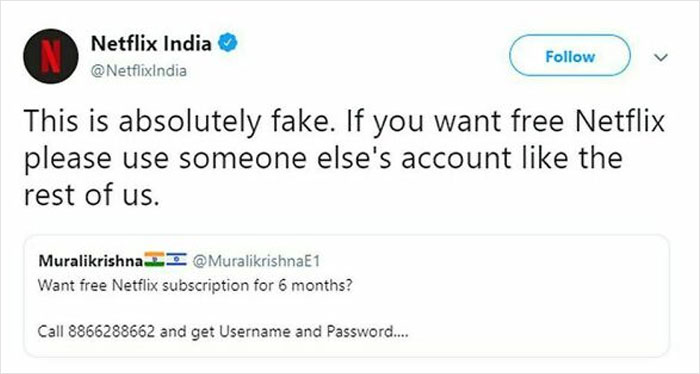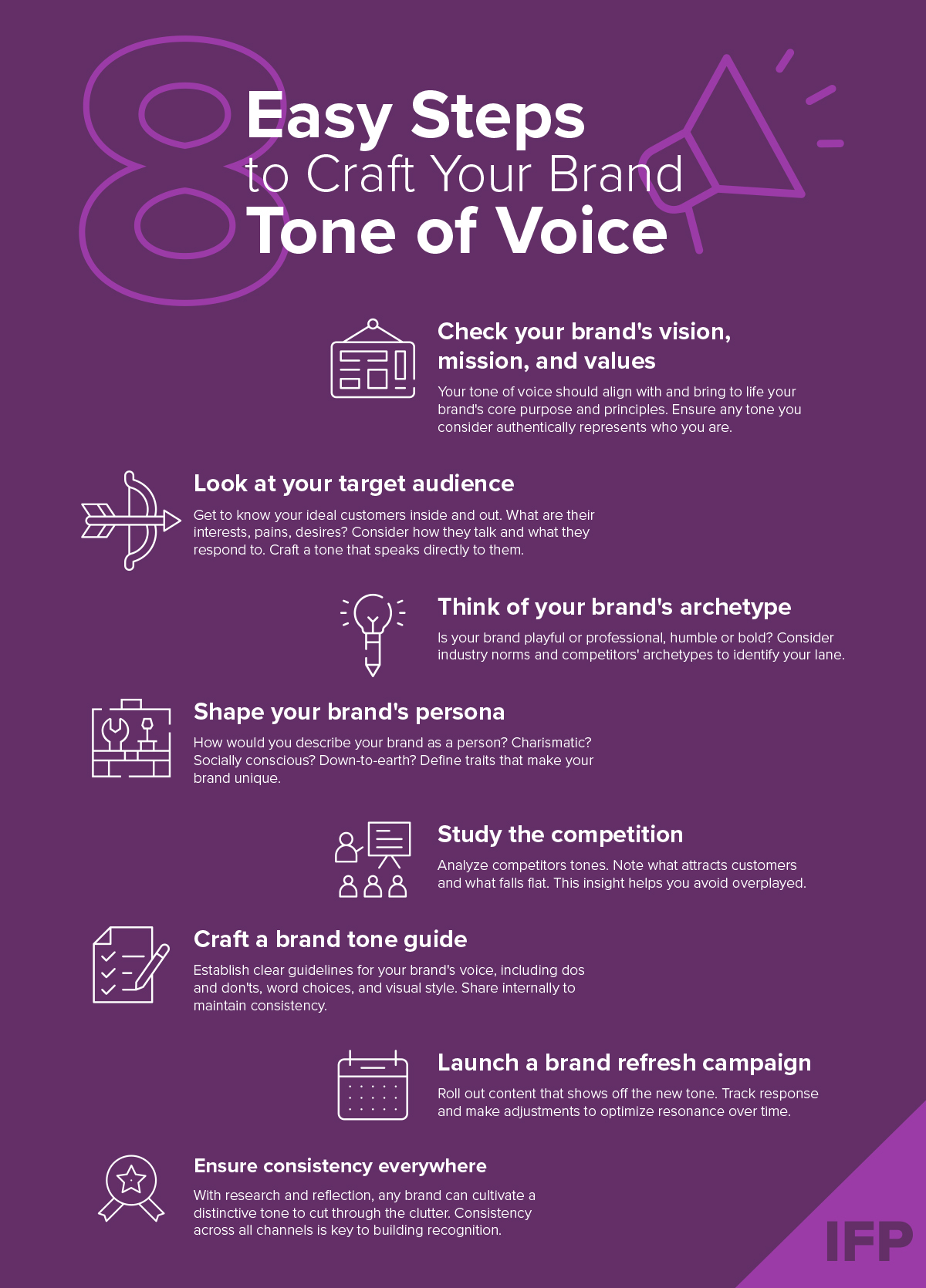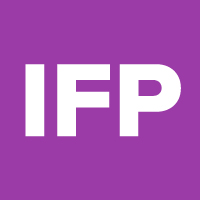Developing a strong brand voice isn't just about choosing a tone; it's about aligning your brand's values with those of your audience while maintaining a positive persona. Positivity is key in shaping your brand identity. While your brand can embrace edginess, it's crucial to avoid negativity. Successful brand voices create an inviting environment, embodying various personality traits while staying upbeat.
To find the right brand voice, engage your audience in conversations across social media platforms, including Facebook, Twitter, Instagram, and LinkedIn. Experiment with different approaches until you find the perfect blend that aligns with your core values. Think of your brand as an influencer—it may take time to discover what resonates with your audience, just like influencers refine their content over time.
Your brand voice is the unique personality projected through communication channels like your website, advertising campaigns, and other marketing materials. It's the consistent tone, style, and messaging that run throughout all branding efforts and reflect your company's values and mission statement.
Consistency is key in creating recognition and trust in a competitive market. Whether emotional, inspiring, or direct, your brand voice should resonate with your target audience across all platforms. It's this consistent personality and character, showcased on social media, your website, advertising, and other marketing materials, that builds recognition and trust, driving your brand's success.
Have you ever noticed how a brand's tone of voice can make you feel a certain way?
Not every tone of voice is created equal; what works for one company might crash and burn for another. A company's tone of voice is really important for creating an emotional connection with potential customers. But it can be hard to find the right tone, since what works for one group may not work for another.
Brands have to think about who their target audience is and what their product is like to choose a tone that represents them best in a competitive market. And with so many options out there, messing up the tone could really damage trust in the brand's marketing efforts.
A company's voice is its secret weapon for building trust and connection with customers. By refining what they say over time, these brands have built a following by communicating honestly and caring about customers in a way people expect.
This article looks at 8 brands that have mastered finding a tone that feels true to them and appeals to lots of people across a wide range of demographics. By seeing how these companies successfully and consistently use tone, other businesses can better talk to loyal customers in a thoughtful, genuine way that brings them closer.
What are examples of tone of voice?
Some examples of tone of voice in marketing are:
- Mailchimp - warm, friendly, helpful
- Versace - bold, seductive, assertive
- The Body Shop - direct, informal, approachable
- Zomato - Conversational, humorous, friendly
- Chane l - Elegant, sensual, and classic
8 winning brands with distinct tones of voice
1. Wendy's
This fast-food chain is the go-to example for brand tone of voice, and for good reason: it's used Twitter to cultivate a savage personality that has won customers over. Take a look at these tweets:

Notice anything? They're directly criticizing their competitors, but not in a way that feels petty or mean. They've clearly cultivated a specific sense of humor that pokes fun, but in a playful way. The fun part is that they even go as far as to poke fun at potential customers:

Some customers even welcome Wendy's insults, showing how successful this branding has been. Of course, it only works because fast food isn't seen as a particularly ‘serious' business. Other brands definitely wouldn't be able to get away with the same thing!
2. Mailchimp
Mailchimp places a high value on the importance of voice and tone in creating empowering content. The company believes that it is more important to be clear than entertaining, but it aims to have a compassionate and conversational tone while being plainspoken, genuine and serving as a translator of difficult concepts.
Although it is a B2B SaaS platform, the company strikes a balance between being amusing and informal, without being too bland or boring. It avoids using passive voice, slang and jargon, and prioritizes positive language. What's more, Mailchimp's sense of humor is subtle and wry, and it cleverly uses cultural references in its writing.
In the tone of voice section of its website, Mailchimp says that it uses "offbeat humor and a conversational voice" to stand out, playing with language to bring joy to its work. The brand also emphasizes that they don't take themselves too seriously either.
3. Starbucks
As they put it, Starbucks is all about being practical and showing personality.
They're straight to the point to avoid confusion but still manage to feel modern and relevant.
At every chance, Starbucks shares their love for coffee. It's rare to find a brand that handles these two sides so well, which is why it's a go-to for city-dwellers, professionals, and anyone who wants to be seen as cool.

4. Duolingo
Duolingo is a perfect example of a company that uses social media (notably Twitter) to focus on its personality and stand out from the crowd. They might be a language-learning app, but their social media posts and the type of content they create is funny, witty and creative that no one might guess from their brand voice. In addition, they're great at thinking out of the box, retweeting and engaging with their followers.
Here's a great example that showcases their showcases their humorous tone:
5. Salesforce
When it comes to talking, Salesforce is all about making connections. Their tone is like chatting with a friendly neighbor over a cup of coffee—warm, easy, and always welcoming. It's the kind of vibe that just makes you want to jump right in and join the conversation.

6. Slack
Because Slack allows third-party creators to add bots to its app, we can see exactly how they view tone of voice in their guidance for bot creators.
This is clearly something the business does itself:

It's clear and concise, but with small tweaks that make the copy very human. It's not trying too hard by making things overwhelmingly quirky, it's just using every day, conversational language we all recognize. Here's another example:

There are some very subtle word choices there. For example, using “realm” for email makes it seem old-fashioned, which in turn makes the “gentle nudge” a push in the direction of progress. Overall, it's something you could easily imagine a friend or colleague saying. This brand voice is all over the app itself as well:
7. Netflix
A truly international brand, Netflix has audiences from all countries, genders, viewpoints, and languages.
When it comes to communication, Netflix adopts an effortlessly cool vibe, as if you're shooting the breeze with a close friend on your living room sofa. Their tone is all about being laid-back and approachable, sprinkled with a generous dose of humor to keep things light and enjoyable. It's like they're inviting you to kick off your shoes, grab some popcorn, and settle in for a good time, no matter where you're from or what language you speak.

8. Dove
British cosmetics brand Dove has built their identity around body positivity and confidence. In an industry where models are generally only one body type, with flawless skin and hair, Dove stands out by highlighting women who don't fit with this set of beauty standards. It might sound simple, but it's effective. Here's the first thing you see on the company's website:

Part of their #ShowUs campaign, Dove is running to tackle the fact that 72% of women in the UK don't feel represented in the ads they see. Rather than choosing standard models, the company works with women with skin conditions, women who are older or larger than the industry standard, who are transgender or non-binary models. This attitude comes out in the language they use as well.

Dove makes use of emoticons and emphasis to create a message that's perhaps more powerful than other brands, and - more importantly - that uses the kind of language its customers use. This makes it more familiar and relatable.
How can you analyze your tone of voice
Insights from a Deloitte Digital study underscore the significance, revealing that 62% of buyers feel they have a relationship with a brand. Deloitte emphasizes the importance of emotional connection and feeling cared for in building long-term relationships between companies and customers. Furthermore, 76% of those considering themselves brand loyal expressed their allegiance to a brand for four years or more.
88% of customers say the experience a company provides is as crucial as its products or services, and of consumers around the world said that they would buy from a brand or boycott it based on its political or social stance on an issue. This means a business' identity holds a lot of weight, particularly when the quality of their products isn't far removed from their competitors'.
But what exactly is brand voice and why is it important? And how do you use tone of voice to build a reputation as a brand you can trust? One key piece of advice is not to blend in with the crowd, and that's exactly what these eight companies with unique brand voices have managed to do.
Your brand's voice is like its personality—it's how it talks and connects with people, guiding every message and relationship.
Having a unique brand voice is crucial. It lets businesses show their personality and message to their target audience. This sets them apart from competitors, builds trust, and creates loyalty.
Look at how Airbnb makes everyone feel welcome, Apple keeps things simple, or Wendy's adds humor—they're great examples. But keeping that voice consistent is tough. Most customers want the same experience every time they interact with you—on social media, emails, or product labels.
Your brand voice isn't just about marketing—it's about trust. It tells customers what to expect from you, making them come back. Each chat is a chance to deepen trust, understand needs, and connect.
Also, a strong brand voice shares your values and mission, especially important for socially responsible businesses. It helps achieve goals while resonating with your audience.
Examples of the various tones of voices
While there is no universal definition of the types of the tone of voice, you can look at the Nielsen Norman Group’s “tone of voice” scale. The scale looks at four parameters for pin-pointing a brand tone of voice:
- Fun tone vs. Serious tone
- Formal tone vs. Casual tone
- Respectful tone vs. Sassy tone
- Enthusiastic tone vs. Matter-of-fact tone
Even brands in the same category can differentiate themselves through their tone of voice. By fine-tuning their communication style, companies can develop a unique voice while staying aligned with their brand's core archetype. This allows brands to distinguish themselves from rivals while honoring their defining qualities. Tweaking tone in this way finds the balance between individual expression and true brand nature. Which brand voice do you association with?
How can you define your brand voice
The way a brand communicates can be just as impactful as the message itself.
It can be playful like Wendy's, informative and friendly like Mailchimp, or authoritative and reassuring like Dove. Finding the right tone of voice is an essential part of building trust and connection with your customers.
This article explored the concept of brand voice and how it can be a powerful tool. We saw examples of successful companies using distinct tones to resonate with their target audiences. Remember, your brand voice is like your company's personality. It should be consistent, reflect your values, and – most importantly – resonate with your ideal customer.
By taking the time to define your brand voice, you can create a unique and memorable experience for your customers, setting yourself apart from the competition and fostering long-term brand loyalty.
Access the latest business knowledge in Marketing
Get Access









Comments
Join the conversation...